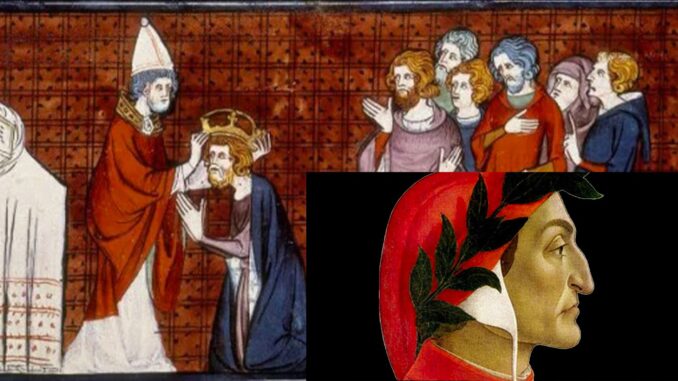by Sebastiano Gaglione
In the Middle Ages there were two major powers: the empire and the papacy.
This theme is treated by Dante above all in the Commedia, in the De Monarchia and in the Convivio.
For the Tuscan poet, the function of the papacy is closely linked to the concept of spirituality.
However, the pope is worldly, while the church is corrupt.
On the occasion of the coming of Emperor Henry VII of Luxembourg, intended to re-establish imperial authority, Dante welcomes his arrival with the drafting of an epistle addressed to him and two others destined for the kings of Italy and the wicked people.
Written in Latin, De Monarchia consists of three books, each of which deals with a different theme:
- I BOOK: Dante takes up the theme already addressed in the Convivio and expresses the need to have an emperor who acts as guarantor of justice and who therefore acts as arbiter of disputes and quarrels. In other words, a ruler of the order;
- II BOOK: For the author of the Divine Comedy, the empire is necessary and the Roman Empire itself is the proof of this statement. The order of the nature of things is preserved only with law. And the Roman people were ordained by nature to the Empire: in fact, as an artist who neglects the means and aims only at the end does not reach perfection, so nature, if she aimed only at the end of things, would make imperfect things.
- BOOK III: The theme of the role of the Church and the Empire is addressed. The Church is seen as the Sun. The Empire is seen as the Moon. Both have different but complementary roles. The Church has the task of dealing with the salvation of people’s souls in eternal life. The Empire, on the other hand, must ensure happiness in earthly life for the people. Both parties, therefore, albeit with different roles, come together in a common goal: human happiness.
Not even in this case did Dante fail in his role as a clear seer of the critical issues of future times, and not only contemporary to him: State and Church are not yet separated.
Through the veiled control of men’s souls, the Church takes part, directly or indirectly, and acquires a decisive say in the institutions, in the economic-social and political choices of the state.
State of the Church, ours, whose sacred laws decisively influence the civil ones; a clear example is provided by the Prime Minister, Giorgia Meloni, in one of the most famous and discussed speeches she gave, in which he defined her person primarily as a Christian.
Italy is a secular and non-denominational republic, therefore devoid of an official religion, yet in every aspect of it, functional, political, civil, and, obviously, religious, the power of the Church is inherent.
However, there is the possibility of finding the cure for one of the unsolved problems of all time, and the latter finds the main drug in the so-called “kenosis”, ie emptying.
The Church must empty itself of the lust for power and move away from the devil’s dung, in other words money, and rediscover its own spirituality in poverty.
Only in this way, dedicating ourselves exclusively to the care of souls faithful to one’s God, not counting on the support of the powerful and not aspiring to self-sufficiency extraneous to the Christian mission, could we finally say that it is in the Church that Christ’s abode is found.

